Servant Leadership Analysis: Volunteer Experience and Principles
VerifiedAdded on 2022/08/19
|5
|1420
|13
Essay
AI Summary
This essay provides an analysis of a student's volunteer experience at Feed My Starving Children (FMSC) and its connection to servant leadership principles. The student details their role in packing and distributing food, arranging volunteers, and managing logistics. The experience allowed the student to apply principles of empathy, healing, stewardship, and community building, aligning with both Greenleaf's servant leadership principles and biblical concepts. The essay highlights specific instances where the student demonstrated leadership by taking initiative, inspiring others, and prioritizing the needs of those served. The volunteer work fostered the development of humility, empathy, and an understanding of the power of serving others. The student reflects on how this experience has shaped their leadership style, emphasizing the importance of considering the needs of others and using these skills in both personal and professional life. The essay concludes by underscoring the valuable lessons learned and the potential for continued growth as a servant leader, emphasizing the importance of community and fairness.
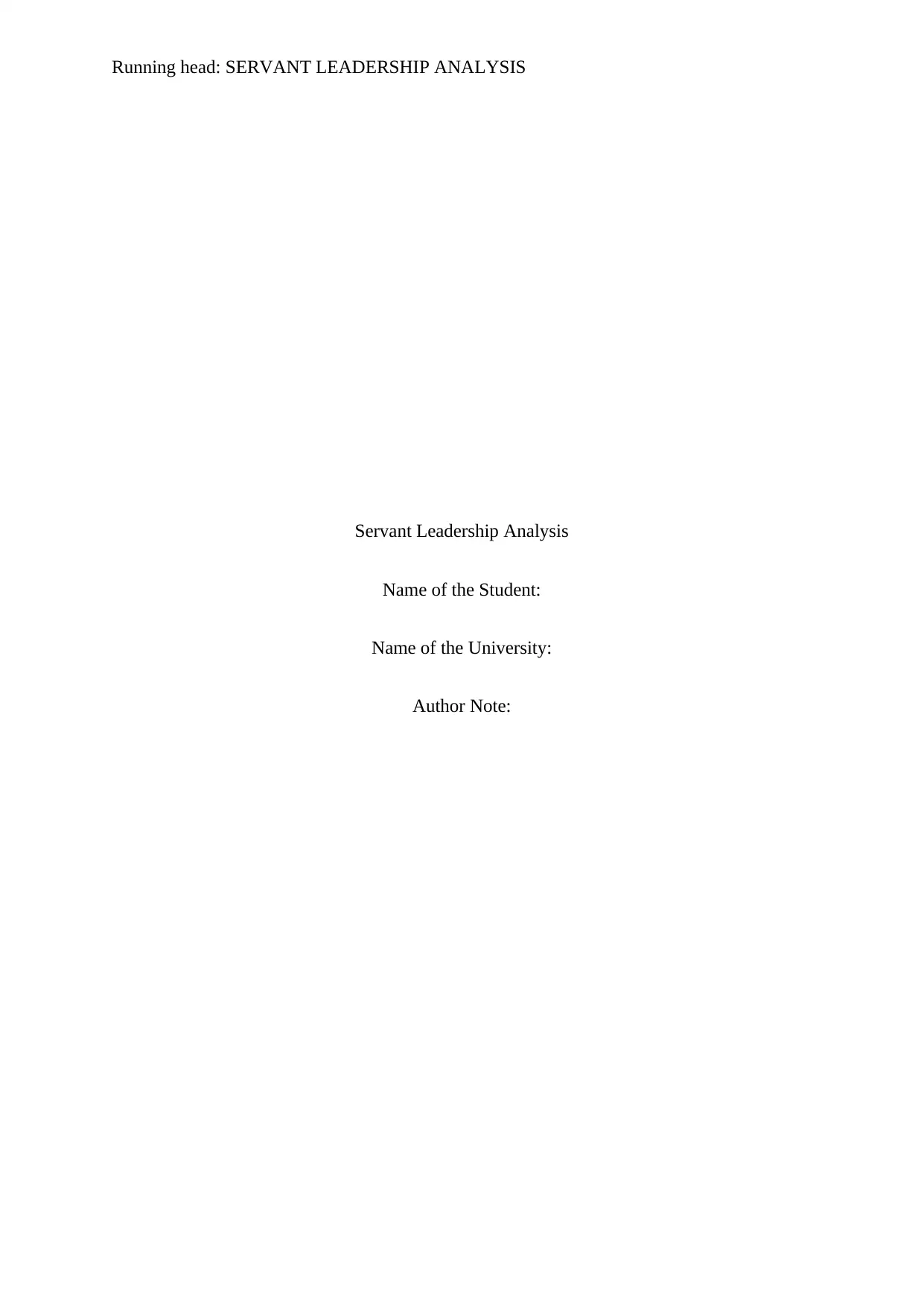
Running head: SERVANT LEADERSHIP ANALYSIS
Servant Leadership Analysis
Name of the Student:
Name of the University:
Author Note:
Servant Leadership Analysis
Name of the Student:
Name of the University:
Author Note:
Paraphrase This Document
Need a fresh take? Get an instant paraphrase of this document with our AI Paraphraser
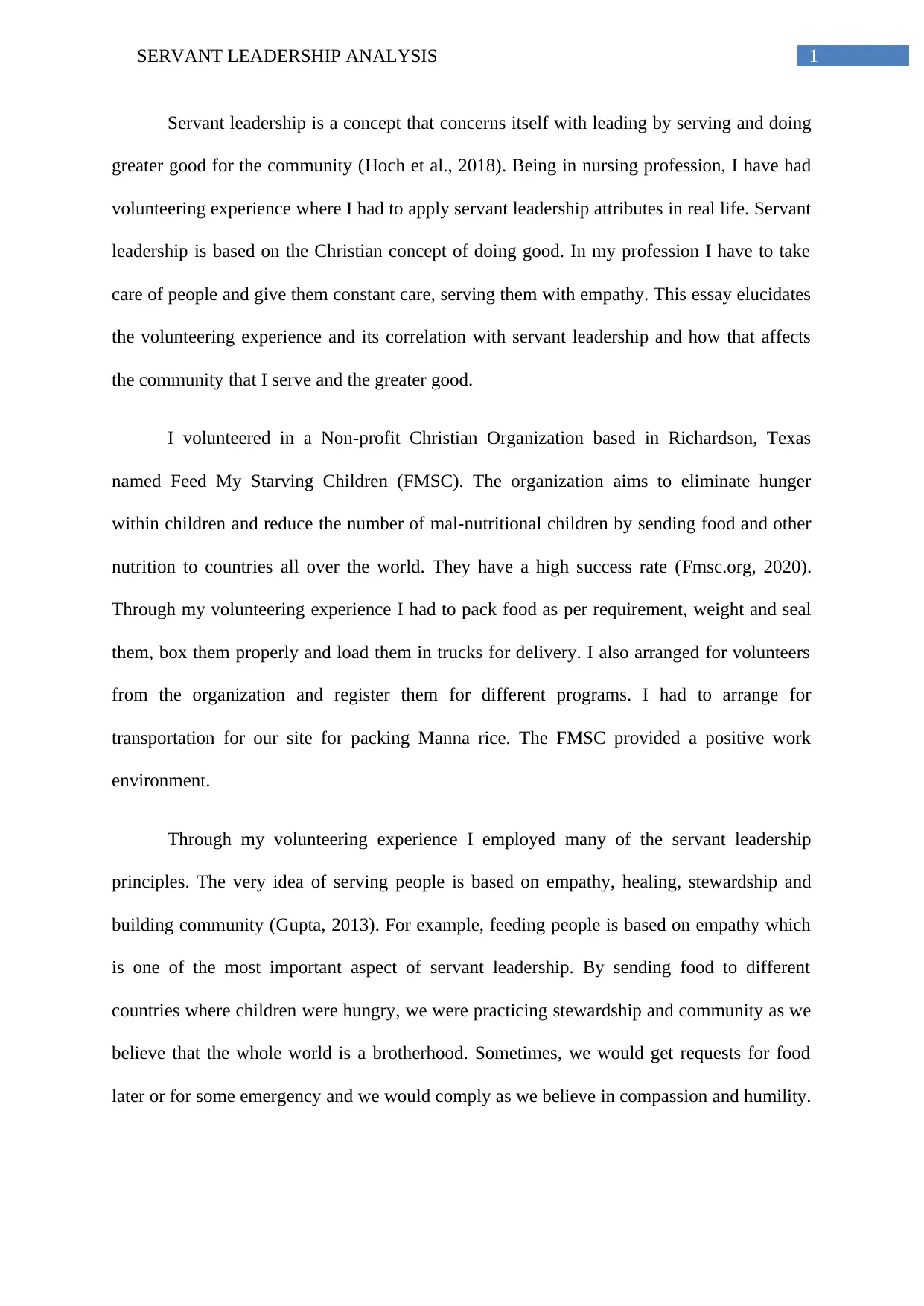
1SERVANT LEADERSHIP ANALYSIS
Servant leadership is a concept that concerns itself with leading by serving and doing
greater good for the community (Hoch et al., 2018). Being in nursing profession, I have had
volunteering experience where I had to apply servant leadership attributes in real life. Servant
leadership is based on the Christian concept of doing good. In my profession I have to take
care of people and give them constant care, serving them with empathy. This essay elucidates
the volunteering experience and its correlation with servant leadership and how that affects
the community that I serve and the greater good.
I volunteered in a Non-profit Christian Organization based in Richardson, Texas
named Feed My Starving Children (FMSC). The organization aims to eliminate hunger
within children and reduce the number of mal-nutritional children by sending food and other
nutrition to countries all over the world. They have a high success rate (Fmsc.org, 2020).
Through my volunteering experience I had to pack food as per requirement, weight and seal
them, box them properly and load them in trucks for delivery. I also arranged for volunteers
from the organization and register them for different programs. I had to arrange for
transportation for our site for packing Manna rice. The FMSC provided a positive work
environment.
Through my volunteering experience I employed many of the servant leadership
principles. The very idea of serving people is based on empathy, healing, stewardship and
building community (Gupta, 2013). For example, feeding people is based on empathy which
is one of the most important aspect of servant leadership. By sending food to different
countries where children were hungry, we were practicing stewardship and community as we
believe that the whole world is a brotherhood. Sometimes, we would get requests for food
later or for some emergency and we would comply as we believe in compassion and humility.
Servant leadership is a concept that concerns itself with leading by serving and doing
greater good for the community (Hoch et al., 2018). Being in nursing profession, I have had
volunteering experience where I had to apply servant leadership attributes in real life. Servant
leadership is based on the Christian concept of doing good. In my profession I have to take
care of people and give them constant care, serving them with empathy. This essay elucidates
the volunteering experience and its correlation with servant leadership and how that affects
the community that I serve and the greater good.
I volunteered in a Non-profit Christian Organization based in Richardson, Texas
named Feed My Starving Children (FMSC). The organization aims to eliminate hunger
within children and reduce the number of mal-nutritional children by sending food and other
nutrition to countries all over the world. They have a high success rate (Fmsc.org, 2020).
Through my volunteering experience I had to pack food as per requirement, weight and seal
them, box them properly and load them in trucks for delivery. I also arranged for volunteers
from the organization and register them for different programs. I had to arrange for
transportation for our site for packing Manna rice. The FMSC provided a positive work
environment.
Through my volunteering experience I employed many of the servant leadership
principles. The very idea of serving people is based on empathy, healing, stewardship and
building community (Gupta, 2013). For example, feeding people is based on empathy which
is one of the most important aspect of servant leadership. By sending food to different
countries where children were hungry, we were practicing stewardship and community as we
believe that the whole world is a brotherhood. Sometimes, we would get requests for food
later or for some emergency and we would comply as we believe in compassion and humility.
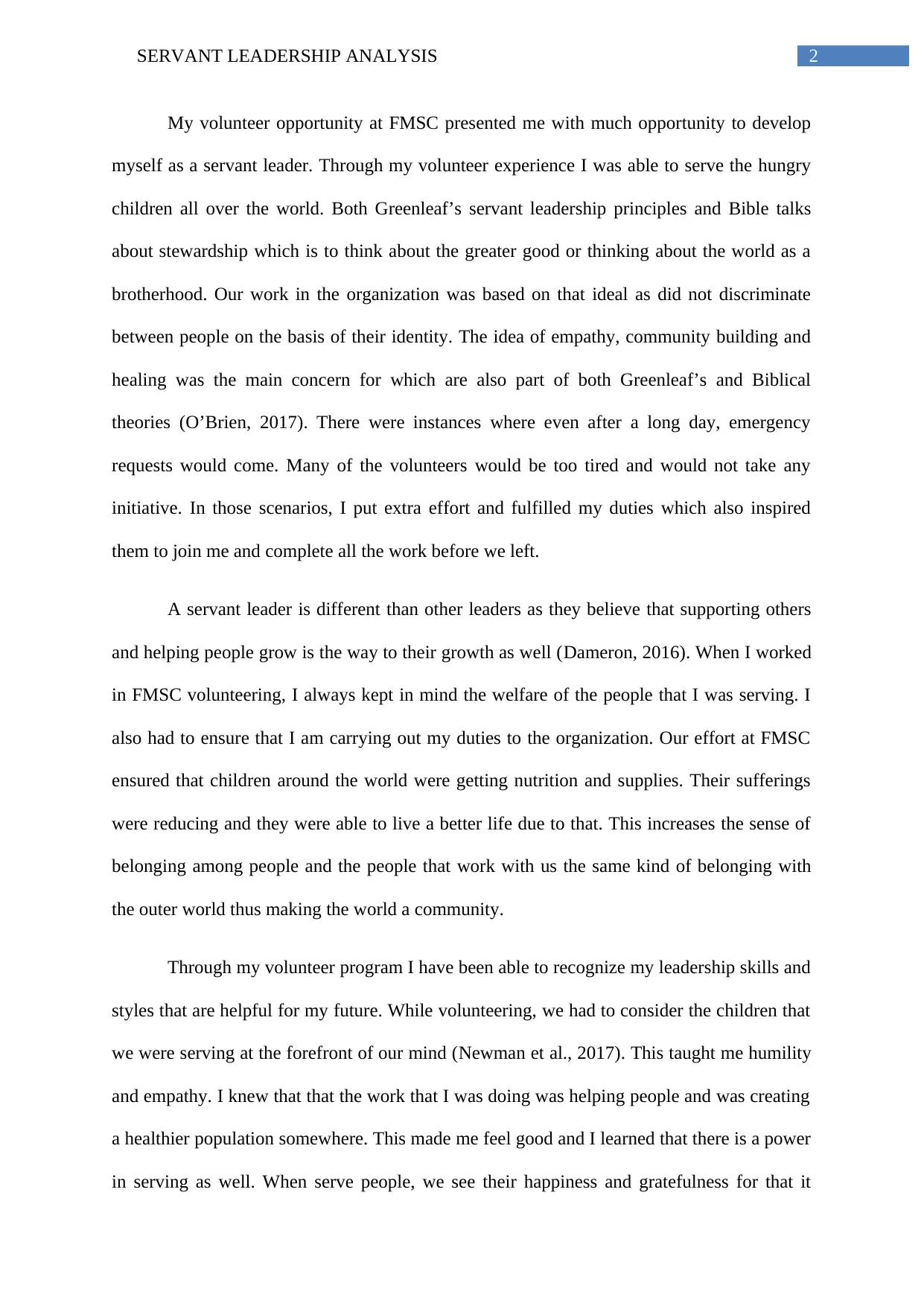
2SERVANT LEADERSHIP ANALYSIS
My volunteer opportunity at FMSC presented me with much opportunity to develop
myself as a servant leader. Through my volunteer experience I was able to serve the hungry
children all over the world. Both Greenleaf’s servant leadership principles and Bible talks
about stewardship which is to think about the greater good or thinking about the world as a
brotherhood. Our work in the organization was based on that ideal as did not discriminate
between people on the basis of their identity. The idea of empathy, community building and
healing was the main concern for which are also part of both Greenleaf’s and Biblical
theories (O’Brien, 2017). There were instances where even after a long day, emergency
requests would come. Many of the volunteers would be too tired and would not take any
initiative. In those scenarios, I put extra effort and fulfilled my duties which also inspired
them to join me and complete all the work before we left.
A servant leader is different than other leaders as they believe that supporting others
and helping people grow is the way to their growth as well (Dameron, 2016). When I worked
in FMSC volunteering, I always kept in mind the welfare of the people that I was serving. I
also had to ensure that I am carrying out my duties to the organization. Our effort at FMSC
ensured that children around the world were getting nutrition and supplies. Their sufferings
were reducing and they were able to live a better life due to that. This increases the sense of
belonging among people and the people that work with us the same kind of belonging with
the outer world thus making the world a community.
Through my volunteer program I have been able to recognize my leadership skills and
styles that are helpful for my future. While volunteering, we had to consider the children that
we were serving at the forefront of our mind (Newman et al., 2017). This taught me humility
and empathy. I knew that that the work that I was doing was helping people and was creating
a healthier population somewhere. This made me feel good and I learned that there is a power
in serving as well. When serve people, we see their happiness and gratefulness for that it
My volunteer opportunity at FMSC presented me with much opportunity to develop
myself as a servant leader. Through my volunteer experience I was able to serve the hungry
children all over the world. Both Greenleaf’s servant leadership principles and Bible talks
about stewardship which is to think about the greater good or thinking about the world as a
brotherhood. Our work in the organization was based on that ideal as did not discriminate
between people on the basis of their identity. The idea of empathy, community building and
healing was the main concern for which are also part of both Greenleaf’s and Biblical
theories (O’Brien, 2017). There were instances where even after a long day, emergency
requests would come. Many of the volunteers would be too tired and would not take any
initiative. In those scenarios, I put extra effort and fulfilled my duties which also inspired
them to join me and complete all the work before we left.
A servant leader is different than other leaders as they believe that supporting others
and helping people grow is the way to their growth as well (Dameron, 2016). When I worked
in FMSC volunteering, I always kept in mind the welfare of the people that I was serving. I
also had to ensure that I am carrying out my duties to the organization. Our effort at FMSC
ensured that children around the world were getting nutrition and supplies. Their sufferings
were reducing and they were able to live a better life due to that. This increases the sense of
belonging among people and the people that work with us the same kind of belonging with
the outer world thus making the world a community.
Through my volunteer program I have been able to recognize my leadership skills and
styles that are helpful for my future. While volunteering, we had to consider the children that
we were serving at the forefront of our mind (Newman et al., 2017). This taught me humility
and empathy. I knew that that the work that I was doing was helping people and was creating
a healthier population somewhere. This made me feel good and I learned that there is a power
in serving as well. When serve people, we see their happiness and gratefulness for that it
⊘ This is a preview!⊘
Do you want full access?
Subscribe today to unlock all pages.

Trusted by 1+ million students worldwide
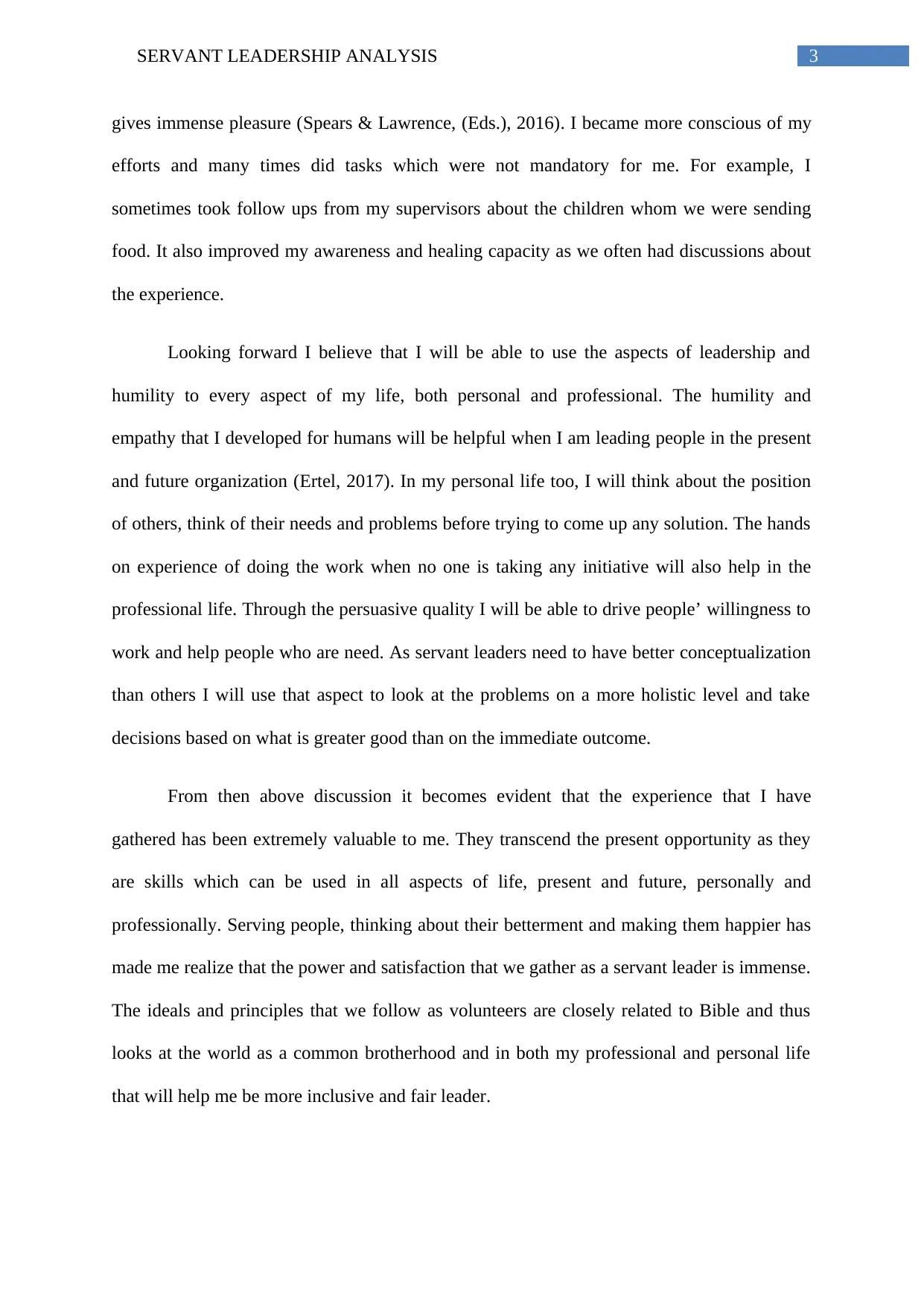
3SERVANT LEADERSHIP ANALYSIS
gives immense pleasure (Spears & Lawrence, (Eds.), 2016). I became more conscious of my
efforts and many times did tasks which were not mandatory for me. For example, I
sometimes took follow ups from my supervisors about the children whom we were sending
food. It also improved my awareness and healing capacity as we often had discussions about
the experience.
Looking forward I believe that I will be able to use the aspects of leadership and
humility to every aspect of my life, both personal and professional. The humility and
empathy that I developed for humans will be helpful when I am leading people in the present
and future organization (Ertel, 2017). In my personal life too, I will think about the position
of others, think of their needs and problems before trying to come up any solution. The hands
on experience of doing the work when no one is taking any initiative will also help in the
professional life. Through the persuasive quality I will be able to drive people’ willingness to
work and help people who are need. As servant leaders need to have better conceptualization
than others I will use that aspect to look at the problems on a more holistic level and take
decisions based on what is greater good than on the immediate outcome.
From then above discussion it becomes evident that the experience that I have
gathered has been extremely valuable to me. They transcend the present opportunity as they
are skills which can be used in all aspects of life, present and future, personally and
professionally. Serving people, thinking about their betterment and making them happier has
made me realize that the power and satisfaction that we gather as a servant leader is immense.
The ideals and principles that we follow as volunteers are closely related to Bible and thus
looks at the world as a common brotherhood and in both my professional and personal life
that will help me be more inclusive and fair leader.
gives immense pleasure (Spears & Lawrence, (Eds.), 2016). I became more conscious of my
efforts and many times did tasks which were not mandatory for me. For example, I
sometimes took follow ups from my supervisors about the children whom we were sending
food. It also improved my awareness and healing capacity as we often had discussions about
the experience.
Looking forward I believe that I will be able to use the aspects of leadership and
humility to every aspect of my life, both personal and professional. The humility and
empathy that I developed for humans will be helpful when I am leading people in the present
and future organization (Ertel, 2017). In my personal life too, I will think about the position
of others, think of their needs and problems before trying to come up any solution. The hands
on experience of doing the work when no one is taking any initiative will also help in the
professional life. Through the persuasive quality I will be able to drive people’ willingness to
work and help people who are need. As servant leaders need to have better conceptualization
than others I will use that aspect to look at the problems on a more holistic level and take
decisions based on what is greater good than on the immediate outcome.
From then above discussion it becomes evident that the experience that I have
gathered has been extremely valuable to me. They transcend the present opportunity as they
are skills which can be used in all aspects of life, present and future, personally and
professionally. Serving people, thinking about their betterment and making them happier has
made me realize that the power and satisfaction that we gather as a servant leader is immense.
The ideals and principles that we follow as volunteers are closely related to Bible and thus
looks at the world as a common brotherhood and in both my professional and personal life
that will help me be more inclusive and fair leader.
Paraphrase This Document
Need a fresh take? Get an instant paraphrase of this document with our AI Paraphraser
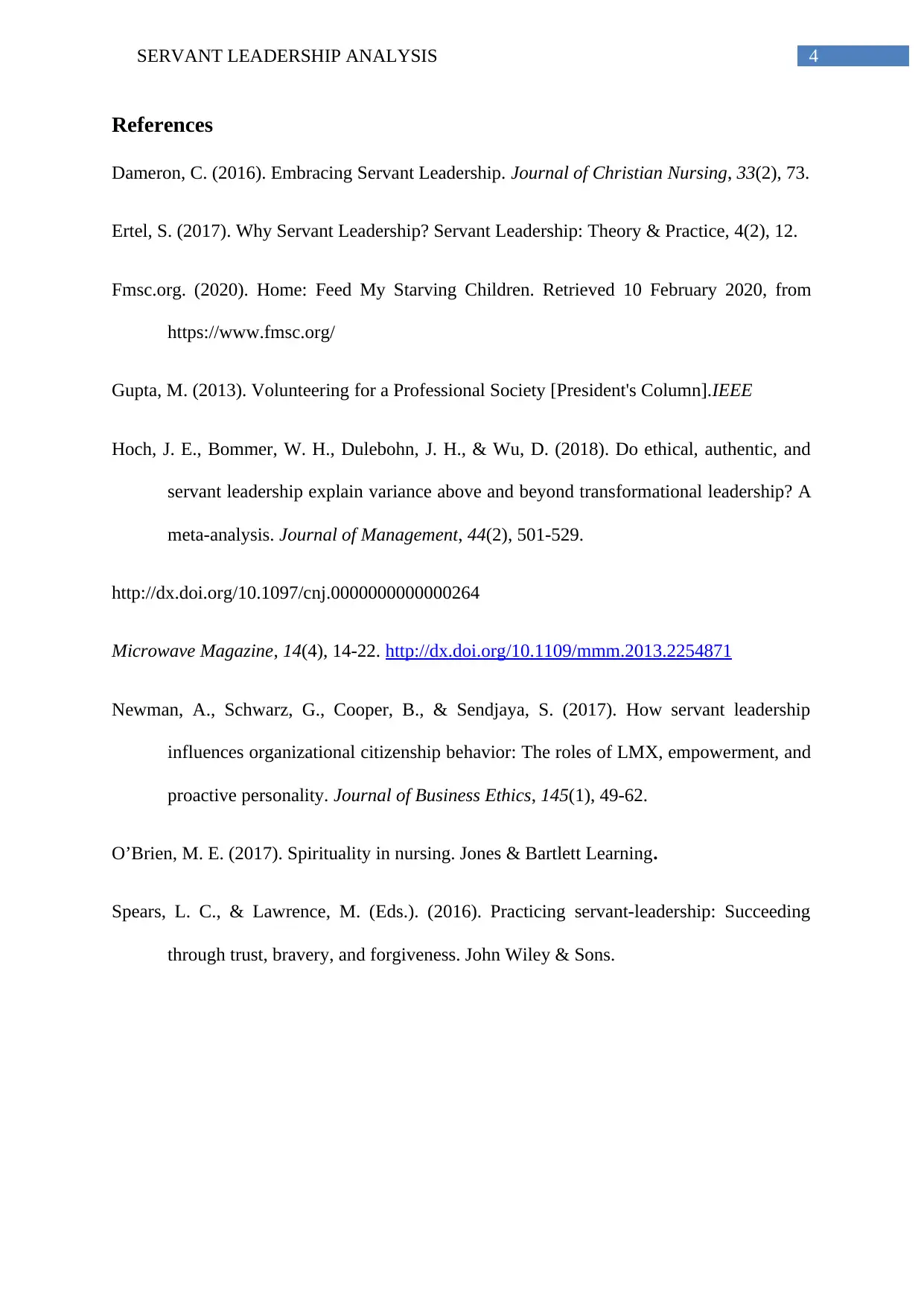
4SERVANT LEADERSHIP ANALYSIS
References
Dameron, C. (2016). Embracing Servant Leadership. Journal of Christian Nursing, 33(2), 73.
Ertel, S. (2017). Why Servant Leadership? Servant Leadership: Theory & Practice, 4(2), 12.
Fmsc.org. (2020). Home: Feed My Starving Children. Retrieved 10 February 2020, from
https://www.fmsc.org/
Gupta, M. (2013). Volunteering for a Professional Society [President's Column].IEEE
Hoch, J. E., Bommer, W. H., Dulebohn, J. H., & Wu, D. (2018). Do ethical, authentic, and
servant leadership explain variance above and beyond transformational leadership? A
meta-analysis. Journal of Management, 44(2), 501-529.
http://dx.doi.org/10.1097/cnj.0000000000000264
Microwave Magazine, 14(4), 14-22. http://dx.doi.org/10.1109/mmm.2013.2254871
Newman, A., Schwarz, G., Cooper, B., & Sendjaya, S. (2017). How servant leadership
influences organizational citizenship behavior: The roles of LMX, empowerment, and
proactive personality. Journal of Business Ethics, 145(1), 49-62.
O’Brien, M. E. (2017). Spirituality in nursing. Jones & Bartlett Learning.
Spears, L. C., & Lawrence, M. (Eds.). (2016). Practicing servant-leadership: Succeeding
through trust, bravery, and forgiveness. John Wiley & Sons.
References
Dameron, C. (2016). Embracing Servant Leadership. Journal of Christian Nursing, 33(2), 73.
Ertel, S. (2017). Why Servant Leadership? Servant Leadership: Theory & Practice, 4(2), 12.
Fmsc.org. (2020). Home: Feed My Starving Children. Retrieved 10 February 2020, from
https://www.fmsc.org/
Gupta, M. (2013). Volunteering for a Professional Society [President's Column].IEEE
Hoch, J. E., Bommer, W. H., Dulebohn, J. H., & Wu, D. (2018). Do ethical, authentic, and
servant leadership explain variance above and beyond transformational leadership? A
meta-analysis. Journal of Management, 44(2), 501-529.
http://dx.doi.org/10.1097/cnj.0000000000000264
Microwave Magazine, 14(4), 14-22. http://dx.doi.org/10.1109/mmm.2013.2254871
Newman, A., Schwarz, G., Cooper, B., & Sendjaya, S. (2017). How servant leadership
influences organizational citizenship behavior: The roles of LMX, empowerment, and
proactive personality. Journal of Business Ethics, 145(1), 49-62.
O’Brien, M. E. (2017). Spirituality in nursing. Jones & Bartlett Learning.
Spears, L. C., & Lawrence, M. (Eds.). (2016). Practicing servant-leadership: Succeeding
through trust, bravery, and forgiveness. John Wiley & Sons.
1 out of 5
Related Documents
Your All-in-One AI-Powered Toolkit for Academic Success.
+13062052269
info@desklib.com
Available 24*7 on WhatsApp / Email
![[object Object]](/_next/static/media/star-bottom.7253800d.svg)
Unlock your academic potential
Copyright © 2020–2025 A2Z Services. All Rights Reserved. Developed and managed by ZUCOL.



